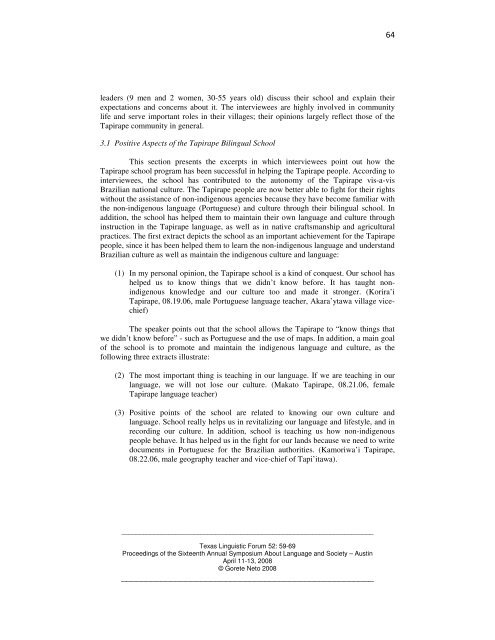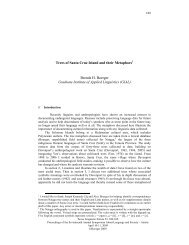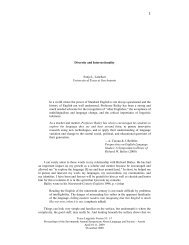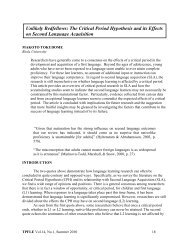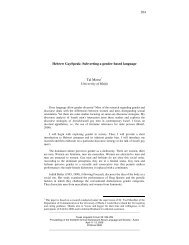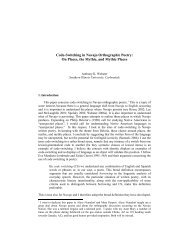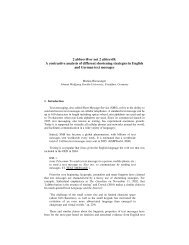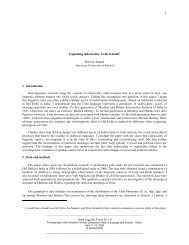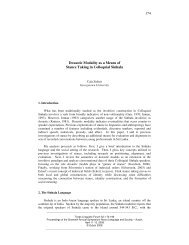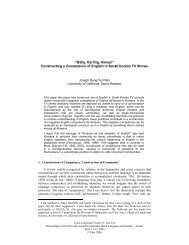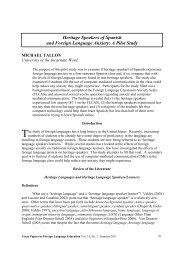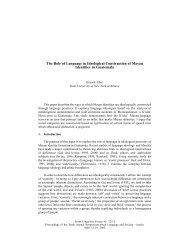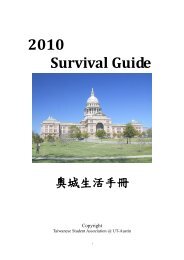The Impact of Bilingual Education on Indigenous Language and ...
The Impact of Bilingual Education on Indigenous Language and ...
The Impact of Bilingual Education on Indigenous Language and ...
Create successful ePaper yourself
Turn your PDF publications into a flip-book with our unique Google optimized e-Paper software.
leaders (9 men <strong>and</strong> 2 women, 30-55 years old) discuss their school <strong>and</strong> explain their<br />
expectati<strong>on</strong>s <strong>and</strong> c<strong>on</strong>cerns about it. <str<strong>on</strong>g>The</str<strong>on</strong>g> interviewees are highly involved in community<br />
life <strong>and</strong> serve important roles in their villages; their opini<strong>on</strong>s largely reflect those <str<strong>on</strong>g>of</str<strong>on</strong>g> the<br />
Tapirape community in general.<br />
3.1 Positive Aspects <str<strong>on</strong>g>of</str<strong>on</strong>g> the Tapirape <str<strong>on</strong>g>Bilingual</str<strong>on</strong>g> School<br />
This secti<strong>on</strong> presents the excerpts in which interviewees point out how the<br />
Tapirape school program has been successful in helping the Tapirape people. According to<br />
interviewees, the school has c<strong>on</strong>tributed to the aut<strong>on</strong>omy <str<strong>on</strong>g>of</str<strong>on</strong>g> the Tapirape vis-a-vis<br />
Brazilian nati<strong>on</strong>al culture. <str<strong>on</strong>g>The</str<strong>on</strong>g> Tapirape people are now better able to fight for their rights<br />
without the assistance <str<strong>on</strong>g>of</str<strong>on</strong>g> n<strong>on</strong>-indigenous agencies because they have become familiar with<br />
the n<strong>on</strong>-indigenous language (Portuguese) <strong>and</strong> culture through their bilingual school. In<br />
additi<strong>on</strong>, the school has helped them to maintain their own language <strong>and</strong> culture through<br />
instructi<strong>on</strong> in the Tapirape language, as well as in native craftsmanship <strong>and</strong> agricultural<br />
practices. <str<strong>on</strong>g>The</str<strong>on</strong>g> first extract depicts the school as an important achievement for the Tapirape<br />
people, since it has been helped them to learn the n<strong>on</strong>-indigenous language <strong>and</strong> underst<strong>and</strong><br />
Brazilian culture as well as maintain the indigenous culture <strong>and</strong> language:<br />
(1) In my pers<strong>on</strong>al opini<strong>on</strong>, the Tapirape school is a kind <str<strong>on</strong>g>of</str<strong>on</strong>g> c<strong>on</strong>quest. Our school has<br />
helped us to know things that we didn’t know before. It has taught n<strong>on</strong>indigenous<br />
knowledge <strong>and</strong> our culture too <strong>and</strong> made it str<strong>on</strong>ger. (Korira’i<br />
Tapirape, 08.19.06, male Portuguese language teacher, Akara’ytawa village vicechief)<br />
<str<strong>on</strong>g>The</str<strong>on</strong>g> speaker points out that the school allows the Tapirape to “know things that<br />
we didn’t know before” - such as Portuguese <strong>and</strong> the use <str<strong>on</strong>g>of</str<strong>on</strong>g> maps. In additi<strong>on</strong>, a main goal<br />
<str<strong>on</strong>g>of</str<strong>on</strong>g> the school is to promote <strong>and</strong> maintain the indigenous language <strong>and</strong> culture, as the<br />
following three extracts illustrate:<br />
(2) <str<strong>on</strong>g>The</str<strong>on</strong>g> most important thing is teaching in our language. If we are teaching in our<br />
language, we will not lose our culture. (Makato Tapirape, 08.21.06, female<br />
Tapirape language teacher)<br />
(3) Positive points <str<strong>on</strong>g>of</str<strong>on</strong>g> the school are related to knowing our own culture <strong>and</strong><br />
language. School really helps us in revitalizing our language <strong>and</strong> lifestyle, <strong>and</strong> in<br />
recording our culture. In additi<strong>on</strong>, school is teaching us how n<strong>on</strong>-indigenous<br />
people behave. It has helped us in the fight for our l<strong>and</strong>s because we need to write<br />
documents in Portuguese for the Brazilian authorities. (Kamoriwa’i Tapirape,<br />
08.22.06, male geography teacher <strong>and</strong> vice-chief <str<strong>on</strong>g>of</str<strong>on</strong>g> Tapi’itawa).<br />
______________________________________________________________________<br />
Texas Linguistic Forum 52: 59-69<br />
Proceedings <str<strong>on</strong>g>of</str<strong>on</strong>g> the Sixteenth Annual Symposium About <strong>Language</strong> <strong>and</strong> Society – Austin<br />
April 11-13, 2008<br />
© Gorete Neto 2008<br />
___________________________________________________<br />
64


